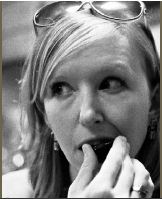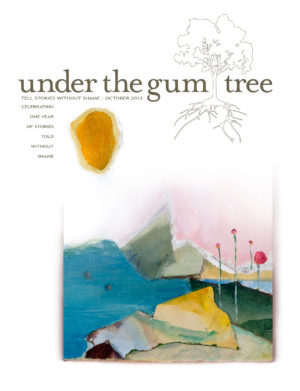Mandy Len

Mandy Len is a writer living and working in Vancouver, BC. Originally from Appalachian Virginia, she sometimes pronounces words like still, will, and fill with two syllables. But only when she’s really tired. You can find her work in Folio, Under the Sun, and The Vancouver Review, among others. Mandy was the recipient of the Adele Weisman scholarship at the Banff Centre for the Arts in 2010 and is a member of A Drift Collective.
“I’d set your alarm clock early enough to get back to my dorm room and finish writing the short story my adviser was expecting that afternoon. If I was lucky I’d have time to shower, dress, go to class, to lunch. If I was lucky, I’d forget about you for an hour. That semester I got zeros on my reading quizzes. I nodded off in lectures. I waited for you to kiss me. But you never did.”
Currently she is working on her memoir about the dangers of love stories, which you can take a peek at on her website: The Love Story Project. Today we’re giving you a glimpse at Mandy’s writing process and inspiration.
When and why did you start writing?
I started writing, really writing in a thoughtful and habitual way, when I was seventeen and working as a K-Mart cashier. Standing in one spot for eight hours scanning bar-codes left me with a head full of chatter. It was almost painful, the noise in my head, and I discovered I could relieve it by writing. I did this whenever I could: on breaks, in the bathroom stall, at the register between customers. I wrote in tiny print on the front and back of the brown recycled-paper towels we kept at each register. I’m pretty sure my best friend still has a stack of letters I sent her while she was away working as a summer camp counselor, all written on brown paper towels.
What do you enjoy most about writing?
I teach, a job which, unlike scanning bar-codes, uses a lot of my creative energy. So sitting down to write sometimes requires really psyching myself up. But once I get into it, I love revising sentences, mulling over words, rearranging paragraphs. Sometimes I think I write too slowly because I get so deeply immersed in the pleasure of craft. Reading a satisfying sentence is like pulling a beautiful cake out of the oven and cutting a slice: I’m so thrilled that I actually made it turn out.
Who or what is your biggest inspiration when you write?
When things get desperate, when I’m digging deep for inspiration, I think about the two years I spent compiling my MFA program’s alumni newsletter. There was one guy who wrote to us both years, and each time he said the same thing: that he was working as a businessman, not a writer, but he used his the skills he picked up during his MFA to edit the local community wine newsletter. I remember thinking about all the money I was spending on my degree, all the nights I woke up at three or four in the morning stuck on some component of an essay I was revising. I did not want to be that guy; I wanted to call myself a writer one day. So some days I think of him. And then I open my computer and get to work.
Do you have a writing schedule?
I write on Mondays and Fridays, the two weekdays I don’t go into campus. It’s taken years but I’ve finally learned to refuse to put anything else first. Regardless of the papers that need grading or the e-mails that need sending, or the students who desperately want to meet with me, I always show up for my writing days.
What is the hardest part of writing for you?
Believing writing is as valuable as all the other ways I could possibly spend my time, as valuable as my paid work and time spent with the people I love. And treating it that way.
Are you working on anything now?
I’m working on a book-length project on the dangers of love stories. It’s an amalgamation of memoir, family mythology, and research on things like the neurochemistry of love and the way sociologists understand storytelling. The book was inspired my parents’ divorce, and my own desire to investigate how their love story shaped everything I thought I understood about love. The essay in issue five of Under the Gum Tree was originally meant for the book. But I realized the piece needed to be written in the direct address, a voice at odds with the rest of the book, so I found a way to make it stand alone.
How many rejections did you get before you had something published? How did you deal with them?
I was lucky to have mentors who told me to expect ten rejections for every publication but who encouraged me to submit anyway, so rejection is always my default expectation. My first essay was rejected four times before it was accepted, and each of those rejections felt like a writer merit badge. I thought, “Okay, another rejection, that must mean I’m doing this right.” Other essays I’ve submitted eight or ten times with no success, which can be frustrating. But I remind myself that as long as I’m still submitting I’m not going to become wine-newsletter guy.
How did you celebrate when you got your first acceptance?
I did what I suspect most people do: I called my mom. I still do that when I get an acceptance letter. And she’s always as happy as the first time. It feels great.
Do you prefer typing or pencil to paper when you write?
I usually write things out by hand when I’m thinking through a scene or idea for the first time. Later I type it into my computer for tinkering and revision. There’s something about the tactile experience of a pen on paper—and maybe also the slowness of it—that feels generative. Some ideas come out in print and others in cursive. I choose the pen and paper based on some instinct that I don’t really understand, and if it doesn’t feel right–physically the pen against the page–I’ll try another combination.
Do you have any advice for other writers?
I suspect it might be better if this space was dedicated to other writers giving me advice. I’ve got some questions: How do you write about family and still respect their privacy? Is it possible to be both honest and kind? And if not, what should I do? How do your promote your work without being annoying, or should I just stop caring and get aggressive about how valuable I believe what I have to say actually is? What do you do on the day you stop believing you have something valuable to say? What if that day comes once every two weeks? Is it better to write slowly, taking real-time with each sentence, or to write quickly and churn out new material and worry about sentences later? What if I finish this book and have nothing else to write about? I’d better stop there. Questions are sometimes disabling.
Is there anything else you would like to share with the readers?
Thank you for reading my piece. Having an audience, however big or small, is such a luxury.

